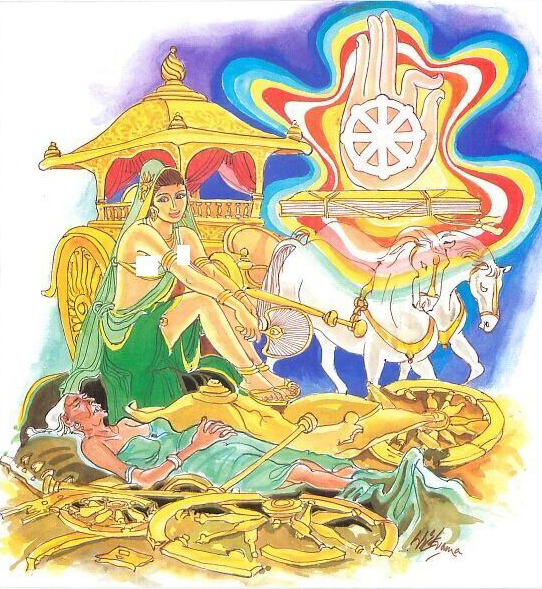Verse 151: The much ornamented royal carriages do wear out, the body also grows old, but the Dhamma of the Virtuous does not decay. Thus, indeed, say the Virtuous among themselves.
1. dhammo/dhamma: The nine Transcendentals, viz, the four Maggas, the four Phalas and Nibbana. (The Commentary)
The Story of Queen Mallika
While residing at the Jetavana monastery, the Buddha uttered Verse (151) of this book, with reference to Mallika, queen of King Pasenadi of Kosala.
One day, Mallika went into the bathroom to wash her face, hands and feet. Her pet dog also came in; as she was bending to wash her feet, the dog tried to have sex with her, and the queen appeared to be amused and somewhat pleased. The king saw this strange incident through the window from his bedroom. When the queen came in, he said angrily to the queen, “Oh, you wicked woman! What were you doing with that dog in the bathroom? Do not deny what I saw with my own eyes.” The queen replied that she was only washing her face, her hands and her feet, and so was doing nothing wrong. Then she continued, “But, that room is very strange. If anyone went into that room, to one looking from this window there would appear to be two. If you do not believe me, O King, please go into that room and I will look through this window.”
So, the king went into the bathroom. When he came out, Mallika asked the king why he misbehaved with a she-goat in that room. The king denied it, but the queen insisted that she saw them with her own eyes. The king was puzzled, but being dim-witted, he accepted the queen’s explanation, and concluded that the bath room was, indeed, very strange.
From that time, the queen was full of remorse for having lied to the king and for having brazenly accused him of misbehaving with a she-goat. Thus, even when she was approaching death, she forgot to think about the great unrivalled charities she had shared with her husband and only remembered that she had been unfair to him. As a result of this, when she died she was reborn in niraya. After her burial, the king intended to ask the Buddha where she was reborn. The Buddha wished to spare his feelings, and also did not want him to lose faith in the Dhamma. So he willed that this question should not be put to him, and King Pasenadi forgot to ask the Buddha.
However, after seven days in niraya, the queen was reborn in the Tusita deva world. On that day, the Buddha went to King Pasenadi’s palace for alms-food; he indicated that he wished to rest in the coach-shed where the royal carriages were kept. After offering alms-food, the king asked the Buddha where queen Mallika was reborn and the Buddha replied, “Mallika has been reborn in the Tusita deva world.” Hearing this the king was very pleased, and said, ‘Where else could she have been reborn? She was always thinking of doing good deeds, always thinking what to offer to the Buddha on the next day. Venerable Sir! Now that she is gone, I, your humble disciple, hardly know what to do.” To him the Buddha said, “Look at these carriages of your father and your grandfather; these are all worn down and lying useless; so also is your body, which is subject to death and decay. Only the Dhamma of the Virtuous is not subject to decay.”
Then the Buddha spoke in verse as follows:
Verse 151: The much ornamented royal carriages do wear out, the body also grows old, but the Dhamma of the Virtuous does not decay. Thus, indeed, say the Virtuous among themselves.
Dhammapada Verse 151
Mallikadevi Vatthu
Jiranti ve rajaratha sucitta
atho sarirampi jaram upeti
satanca dhammo1 na jaram upeti
santo have sabbhi pavedayanti.
Source: Tipitaka








Add a comment